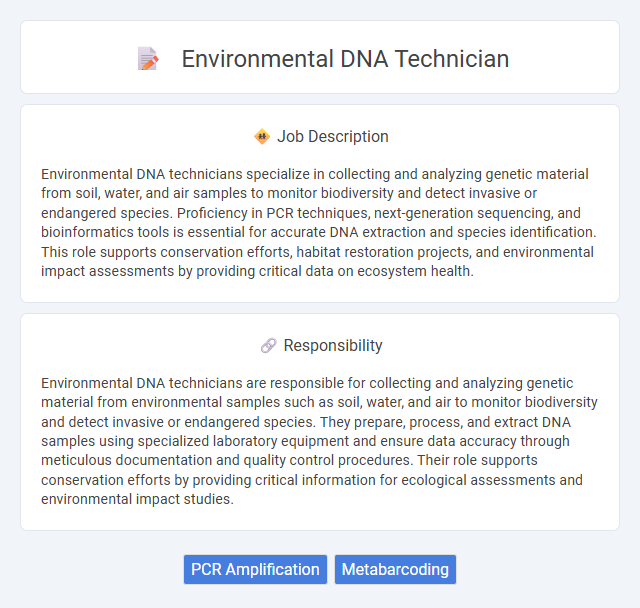
Environmental DNA technicians specialize in collecting and analyzing genetic material from soil, water, and air samples to monitor biodiversity and detect invasive or endangered species. Proficiency in PCR techniques, next-generation sequencing, and bioinformatics tools is essential for accurate DNA extraction and species identification. This role supports conservation efforts, habitat restoration projects, and environmental impact assessments by providing critical data on ecosystem health.
Individuals who have a strong attention to detail and an interest in molecular biology or ecology are likely to be well-suited for an Environmental DNA (eDNA) technician role. Those who prefer fieldwork combined with lab analysis may find this job particularly engaging, though it might be less ideal for people who are uncomfortable with handling biological samples or working outdoors in varying conditions. Candidates with good patience for repetitive tasks and a willingness to adapt to evolving scientific techniques could have a higher probability of thriving in this position.
Qualification
An Environmental DNA (eDNA) technician typically requires a bachelor's degree in environmental science, biology, or a related field, with strong knowledge of molecular biology techniques such as DNA extraction, PCR, and sequencing. Proficiency in laboratory skills, attention to detail, and experience with data analysis software are essential to accurately detect and monitor species in aquatic and terrestrial ecosystems. Certifications in environmental sampling methods and familiarity with regulatory compliance standards enhance job qualifications and career prospects in this specialized role.
Responsibility
Environmental DNA technicians are responsible for collecting and analyzing genetic material from environmental samples such as soil, water, and air to monitor biodiversity and detect invasive or endangered species. They prepare, process, and extract DNA samples using specialized laboratory equipment and ensure data accuracy through meticulous documentation and quality control procedures. Their role supports conservation efforts by providing critical information for ecological assessments and environmental impact studies.
Benefit
Environmental DNA technician roles likely offer benefits such as contributing to biodiversity monitoring and conservation efforts, which may provide a strong sense of purpose and job satisfaction. The position probably presents opportunities to develop specialized skills in molecular biology and data analysis, enhancing career growth and employability. Competitive salaries and potential fieldwork experiences could further increase the appeal of this career path.
Challenge
Environmental DNA technician roles may involve challenges such as accurately collecting and analyzing trace genetic material from complex environmental samples, where contamination risks and low DNA concentration can affect data reliability. The probability of encountering rapidly evolving methodologies requires continuous learning and adaptation to new molecular techniques and bioinformatics tools. Managing large datasets and ensuring precise interpretation of biodiversity information might also present significant technical and logistical difficulties.
Career Advancement
Environmental DNA technicians gain expertise in molecular biology techniques and biodiversity monitoring, positioning themselves for roles in conservation science and ecological research. Proficiency in eDNA sample collection, analysis, and data interpretation opens pathways to project management and specialized positions within environmental consulting firms or governmental agencies. Continuous skill development in bioinformatics and environmental policy can accelerate career advancement toward leadership roles in environmental monitoring and resource management.
Key Terms
PCR Amplification
An Environmental DNA (eDNA) technician specializes in PCR amplification to detect and quantify genetic material from environmental samples, enabling the identification of species presence without direct observation. Mastery of polymerase chain reaction (PCR) techniques ensures high sensitivity and specificity in amplifying target DNA sequences from water, soil, or air samples. This role demands precision in laboratory protocols and knowledge of contamination control to maintain data integrity for ecological monitoring and biodiversity assessments.
Metabarcoding
Environmental DNA (eDNA) technicians specializing in metabarcoding analyze genetic material from environmental samples to identify and monitor biodiversity. They use advanced molecular techniques and bioinformatics tools to amplify and sequence DNA barcodes, enabling accurate detection of species presence in aquatic or terrestrial ecosystems. Their work supports conservation efforts, invasive species management, and ecosystem health assessments by providing rapid, non-invasive biodiversity data.
 kuljobs.com
kuljobs.com